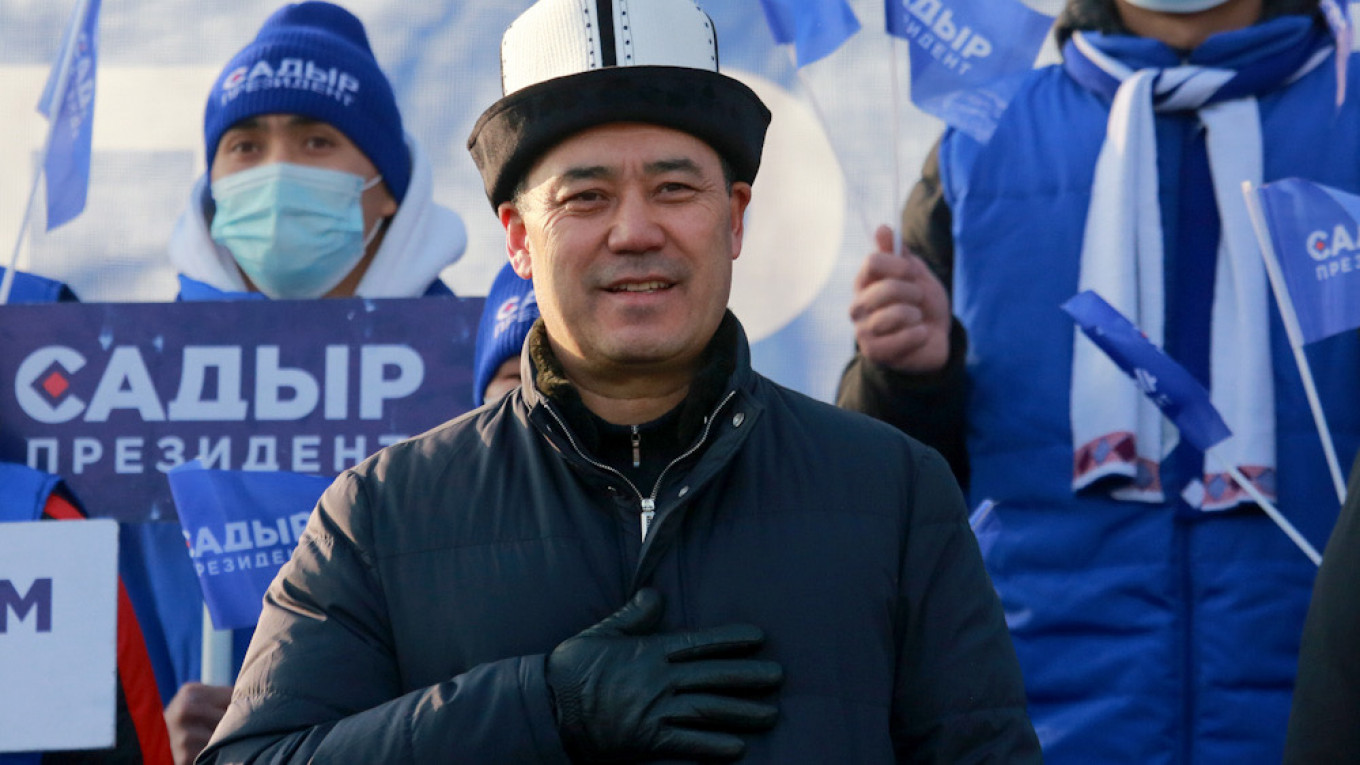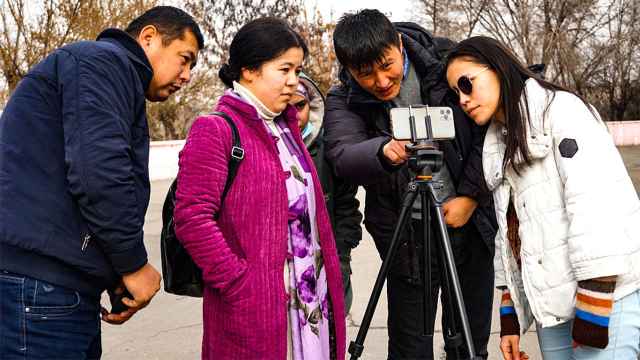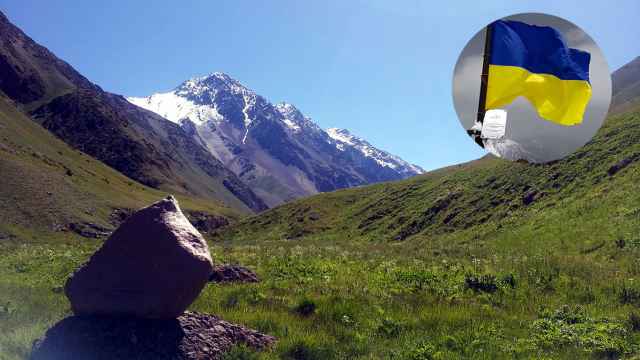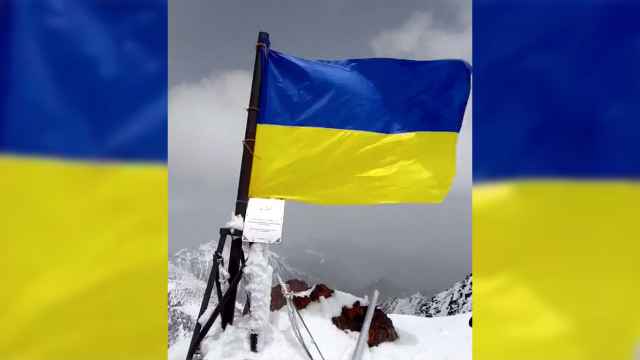With the nationalist politician Sadyr Japarov sweeping to a landslide victory in Sunday’s presidential poll, Kyrgyzstan’s independent media outlets are facing uncertain times ahead.
Following physical and online attacks against journalists in recent months and an election campaign that saw Japarov angrily turn on critical media, Kyrgyzstan’s feisty and independent media scene is anxiously waiting to see if there will be a crackdown on outlets that are not in favor with the new regime.
After being sprung from prison during the chaos of a night of violence following a rigged parliamentary election in early October, Japarov propelled himself into the role of acting president in a matter of days. To aid his ascent he had galvanized his popular support base. Using a cocktail of violent coercion and intimidation, these supporters helped smooth their man’s route to the top.
It remains unclear who was behind Japarov’s release from prison — where he was serving a ten-year sentence on kidnapping charges — and subsequently aided his rapid rise to power then bankrolled his campaign, which far outspent rivals. However, persistent rumors — which he strongly denies — point to the organized crime groups whose tentacles reach into every corner of Kyrgyzstan.
In November, the then acting president reacted aggressively to reports about these links aired by the Kyrgyz wing of the U.S.-funded Radio Liberty, accusing it of distorting his words and twisting information to tarnish his reputation.
The remarks were quickly seized upon by his large social media following in what has fast become a hostile environment for the free press. The flames were fanned by posts labeling Radio Liberty “idiotic provocateurs” and “enemies of the people.”
Tension between the media and the nationalist firebrand’s supporters had already turned ugly during the tense days of October, as rival groups vied for power as mobs gathered in the centre of the capital, Bishkek.
Journalists from Radio Liberty and the independent media outlet Kloop were subject to attacks and threats by Japarov’s supporters while covering these rallies. At one point, Japarov’s fans threatened to burn Radio Liberty’s headquarters down. His response was to sigh that he had so many supporters that he could not always control them.
Radio Liberty and Kloop are a persistent thorn in the side of the authorities in Kyrgyzstan. In 2019 the outlets teamed up with the Organized Crime and Corruption Reporting Project to expose a massive smuggling ring on the Chinese border. The scheme, which by the Kyrgyz government’s own admission cost the state around $1 billion in revenue, was allegedly overseen by Rayimbek Matraimov, commonly known as Rayim Million, a former deputy head of the Kyrgyz customs service.
Japarov has vowed to tackle corruption. Matraimov was hauled in for questioning in October over these allegations, but quickly released into house arrest after agreeing to pay back $24.5 million into the state coffers in what Japarov has acknowledged was a “political decision.”
Alarm bells
The incoming president is also intent on changing the constitution to bring back presidential rule, a move that was backed by more than 80 % of voters in a simultaneous referendum vote held on election day.
The precise nature of constitutional reform has yet to be decided, but one controversial proposal in the draft constitution has set alarm bells ringing for the media over censorship. The wide-ranging clause could ban media outlets that publish content that goes against the “moral values and traditions of the peoples of Kyrgyzstan” – a subjective concept that the press fears could be used as a muzzle against outlets that do not toe the line.
The courts are already utilized as a tool to tie up media outlets in protracted libel cases. For a year, Radio Liberty and Kloop have been involved in a legal battle with Rayim Million, who is accusing them of besmirching his “honor and dignity” over the corruption allegations. The next hearing is due this Friday.
The sniping against Kyrgyzstan’s vibrant independent media has continued through the campaign, and in a victory speech on election night Japarov again took the opportunity to take a pot-shot at Radio Liberty, which he accused of distorting his words during the campaign.
He then proffered an olive branch, with a caveat: He offered to defend the media on condition that it does not twist his words or use them out of context. “Then there will be no persecution,” he promised.
With the incoming president winning a huge mandate, with over 79 % of the vote — albeit on a dismal turnout of 40% — and with his political opponents and Kyrgyzstan’s liberal community thoroughly demoralized by the meteoric ascent of a populist conservative, he should be able to bulldoze his vision of Kyrgyzstan through, much as he bulldozed his way into power.
As Japarov prepares to assume office, journalists are nervously asking themselves: Is there space for probing, critical, media in this new Kyrgyzstan?
A Message from The Moscow Times:
Dear readers,
We are facing unprecedented challenges. Russia's Prosecutor General's Office has designated The Moscow Times as an "undesirable" organization, criminalizing our work and putting our staff at risk of prosecution. This follows our earlier unjust labeling as a "foreign agent."
These actions are direct attempts to silence independent journalism in Russia. The authorities claim our work "discredits the decisions of the Russian leadership." We see things differently: we strive to provide accurate, unbiased reporting on Russia.
We, the journalists of The Moscow Times, refuse to be silenced. But to continue our work, we need your help.
Your support, no matter how small, makes a world of difference. If you can, please support us monthly starting from just $2. It's quick to set up, and every contribution makes a significant impact.
By supporting The Moscow Times, you're defending open, independent journalism in the face of repression. Thank you for standing with us.
Remind me later.






